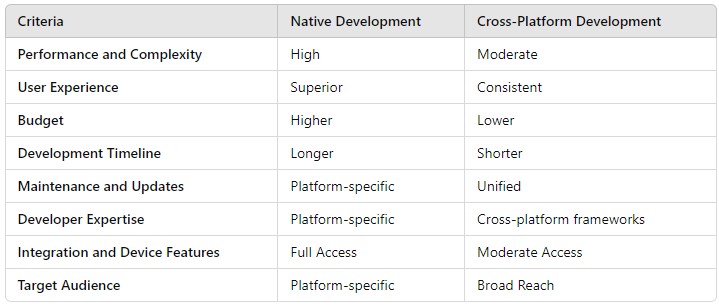As businesses are expanding their investments in mobile app development to improve consumer engagement, streamline processes, and boost growth. Choosing between native and cross-platform mobile app development is a critical decision that will impact app performance, user experience, and overall success.
Mobile App Development Stats and Facts
1- Market size: The global mobile application market was valued at USD 154.05 billion in 2019 and is projected to grow at a compound annual growth rate (CAGR) of 11.5% between 2020 and 2027.
2- App usage: Users devote 88% of their mobile time to apps.
3- Revenue: Mobile apps are expected to generate over $935 billion in revenue through paid downloads and in-app advertising by 2021.
4- App availability: As of 2021, the Google Play Store has 2.87 million apps, while the Apple App Store has 1.96 million.
Native vs. Cross-Platform App Development: Difference?
Native App Development

Creates programs for a single platform, such as iOS or Android, using the platform’s native programming languages (Swift/Objective-C for iOS, Java/Kotlin for Android). These applications are built with the respective platform’s development environment, such as Xcode for iOS and Android Studio for Android.
Cross-Platform App Development
On the other hand, it enables developers to create applications that work on multiple platforms (iOS and Android) using the same codebase. Popular cross-platform frameworks include React Native, Flutter, and Xamarin.
Understanding Native App Development
Advantages of Native App Development
1- Performance: Native apps are platform-specific, resulting in faster and more responsive performance.
2- User experience: These apps provide a great user experience by following the platform’s guidelines and design concepts.
3- Access to all device functions: Native apps have full access to all device functions, including the camera, GPS, and microphone, allowing seamless integration.
4- Security: Native apps can use platform-specific security features and practices.
5- Stability and reliability: Native apps are more stable and reliable because they are integrated into the platform’s ecosystem.
Disadvantages of Native App Development
1- Cost: Developing separate apps for iOS and Android can be more expensive.
2- Time-consuming: Setting up and maintaining two separate codebases can be time-consuming.
3- Resource-intensive: Developers must be proficient in specific programming languages and development environments.
Top 5 Examples of Native Apps
1- WhatsApp: A native app for both iOS and Android that is known for its performance and reliability.
2- Spotify: A music streaming service that offers a seamless user experience through its native app.
3- Instagram: Initially developed as a native iOS app, Instagram offers excellent performance and user experience.
4- Pinterest: A native app that uses platform-specific features to enhance user engagement.
5- Waze: A navigation app that offers real-time data and smooth performance through its native development.
Understanding Cross-Platform App Development
Advantages of Cross-Platform App Development
1- Cost-effective: Create and maintain a single codebase for multiple platforms, reducing development costs.
2- Faster development: The same code is used across all platforms, simplifying the development process.
3- Increased market reach: Launch simultaneously on iOS and Android.
4- Consistency: Provides a similar user experience across all platforms.
5- Easy maintenance: Updates and bug fixes are easy to implement across all platforms.
Disadvantages of Cross-Platform App Development
1- Performance issues: may not work as well as native software, especially for graphically demanding tasks.
2- Limited access to device functionality: you may not have access to all native functionality of the device or you may need to install additional plugins.
3- User experience: platform-specific design requirements may not be followed properly, which may impact user experience.
4- Integration issues: may be more difficult to integrate with local settings, preferences, and notifications.
5- Framework dependency: using a third-party framework, which may have its own issues and limitations.
Budget, timeline, target audience, and required app features play a key role in determining whether to develop a native or cross-platform app. Native apps offer better performance and user experience, making them suitable for applications that require fast response times and platform-specific functionality. On the other hand, cross-platform apps are a more cost-effective and efficient way to reach a large audience on both iOS and Android platforms. Consider the benefits and drawbacks of each strategy to find the most suitable strategy for your individual app development needs.
How do I choose between native and cross-platform development?

When choosing between native and cross-platform development, you should evaluate several elements that will affect the success of your project. The following choice matrix streamlines the review process, helping you determine the optimal choice based on your individual needs.
Our experience with native vs. cross-platform applications
You must devote resources to a mobile app development strategy that’s tailored to your company’s specific goals and objectives, as well as your target market, regardless of the economy you operate in.
Your company’s demands will dictate whether you create native apps, hybrid applications, or cross-platform applications. The first step for organizations in designing creative and successful apps is to determine what they need. Once they have a clear understanding of what they need, they can begin researching the development platforms that are best suited to meet those needs.
Native, hybrid, and cross-platform app development all have their advantages and disadvantages; choosing one over the others requires taking a step back and thinking about the bigger picture and what you want to achieve with the app. In the long run, this will help you achieve success by enabling you to create a cutting-edge and engaging mobile app.
Summary
With the ever-increasing number of apps available on the Google Play Store and Apple App Store, it can be difficult to identify the secret formula for a successful app launch. It is important to have a thorough understanding of the key features, benefits, and drawbacks of native vs. cross-platform mobile development. This knowledge will help you determine the optimal development technique for your firm and provide you with a competitive advantage.
Choosing the appropriate development approach is difficult but important. Consider the app’s intended use, available resources, and target audience. By carefully examining these factors, you can make an informed selection that matches your business objectives and sets your app apart in a crowded marketplace.























